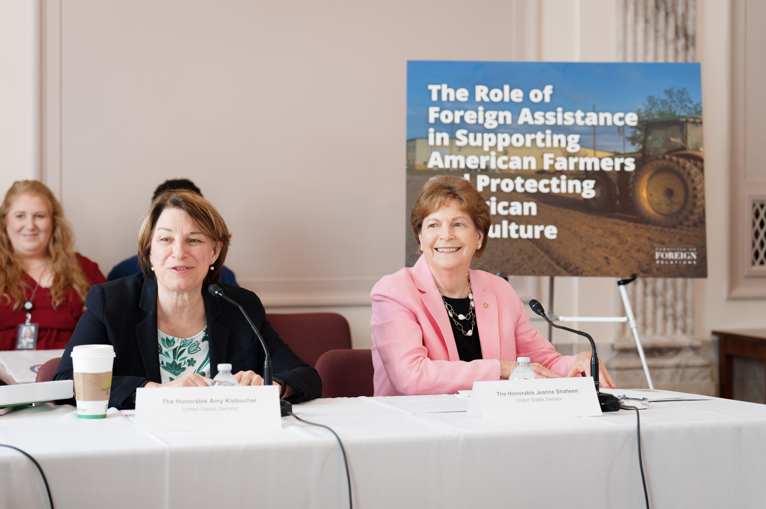ICYMI: Ranking Members Shaheen and Klobuchar Host Spotlight Forum on the Impact of the Trump Administration’s Foreign Assistance Cuts on American Farmers

WASHINGTON—Last week, U.S. Senators Jeanne Shaheen (D-NH), Ranking Member of the Senate Foreign Relations Committee, and Amy Klobuchar (D-MN), Ranking Member of the Senate Agriculture, Nutrition and Forestry Committee, convened Senators for a spotlight forum with experts entitled “The Role of Foreign Assistance in Supporting American Farmers and Protecting American Agriculture.”
Ranking Member Shaheen said: “While the architect of the DOGE attack on the United States Agency for International Development, Elon Musk, may no longer be part of the Trump Administration, the consequences of his actions will be felt by Americans and people around the world for decades to come. That includes serious impacts on American farmers, ranchers, and agricultural businesses, as well as the safety of our domestic crops and livestock.”
Ranking Member Klobuchar said: “Our farmers are already facing major headwinds and the Administration's cuts to foreign food aid and research have been another critical blow—threatening billions in lost revenue, closing off foreign markets, and leaving us vulnerable to plant and animal pests and diseases. We need to reverse course before it’s too late and lasting damage is done.”
Ranking Member Shaheen and her colleagues heard from agriculture and foreign assistance leaders that the Trump Administration’s destruction of U.S. foreign assistance is harming U.S. farmers, ranchers and agribusiness while worsening global food security.
During the event, Ranking Member Shaheen asked the speakers how the Trump Administration’s reckless cuts jeopardize efforts to monitor and prevent livestock and crop diseases here at home. Kevin Shea, Former Administrator of the Animal and Plant Health Inspection Service at USDA, explained how different plant and animal diseases are dangerously close to reaching our shores: “The reductions in the Animal and Plant Health Inspection Service: 15-20% of experienced people with expertise have either been fired or fomented strongly to leave the agency... and there couldn’t be a worse time to lower our guard. You mentioned African swine fever—in the Dominican Republic, very close to our shores... Foot-and-mouth disease, eradicated a century ago in America, now appearing all around the world for the first time in many years... And screwworm, which has breached the barrier we had in Panama for many years, has made it into Mexico—another major concern for us.”
The panelists also spoke to how these cuts are handing our adversaries—like the PRC—a strategic advantage as they step in to fill the void left by the U.S. “We’ve seen for some time now China trying to play in this space, but they don’t do it in the way that we do it,” said Sarah Charles, Former Assistant to the Administrator of USAID’s Bureau for Humanitarian Assistance. “Most recently, we saw in the earthquake response in Myanmar—one of the largest earthquakes that have we’ve seen in sometime—a very limited U.S. government response because the capacity had been taken offline by the Trump administration. The networks that the U.S. government had with non-governmental partners—the civil society organizations that work across conflict lines and are focused on reaching need where it is—those were abandoned in favor of assistance through very repressive and autocratic regimes.” David Hughes, Director of the USAID Innovation Lab on Current and Emerging Threats to Crops at Penn State University, explained that talented scientists are being recruited by Beijing and choosing to leave the U.S. and Europe: “They’re just far superior, and a lot of European and American scientists are decamping to China for that reason... So, China will absolutely fill that space both in applied research, and it certainly will fill the space in terms of AI."
Thoric Cederstrom, International Food Aid Representative, U.S. Dry Bean Council, spoke to how foreign assistance and agricultural assistance prevents conflict and builds global stability: “Foreign assistance builds global stability, which safeguards the future of American agriculture. When U.S. foreign aid supports food security and economic development abroad, it reduces the drivers of conflict, migration and global instability—conditions that otherwise require costly military or humanitarian interventions. A more stable world means safer global trade, growing markets for U.S. agricultural products and less volatility in global grain and bean markets.”
Congressional participants included:
-
Ranking Member Jeanne Shaheen (D-NH)
-
Ranking Member Amy Klobuchar (D-MN)
-
Senator Cory Booker (D-NJ)
-
Senator Tim Kaine (D-VA)
-
Senator Peter Welch (D-VT)
Panelists included:
-
David Hughes, Director of the USAID Innovation Lab on Current and Emerging Threats to Crops at Penn State University
-
Kevin Shea, Former Administrator of the Animal and Plant Health Inspection Service, USDA
-
Sarah Charles, Former Assistant to the Administrator of USAID’s Bureau for Humanitarian Assistance
-
Thoric Cederstrom, International Food Aid Representative, U.S. Dry Bean Council
###